Pungidasa's Blog, page 7
November 29, 2018
Is Digitalization killing humans ?

I have an app to book a cab.
I have an app to book a ticket.
I have an app for buying groceries.
I have an app for buying milk, bakery products, find people who I can date and what not.
My phone is filled with apps for social media, apps for improving efficiency, apps for this, apps for that.
We still have to use our hands to wash our bum. There is not yet an app for it. Let’s wait and watch for that one too.
Before I go off track, let me tell you how we did all of these chores when there were no apps.
I bought the milk from the milkman. Went to shops, met the owner, bargained with him and brought home an appliance after having checked with people on the phone for reviews. We met people for coffee, tea and had food, we did not take photos of them specifically to put them in an app. Reel photos meant we remembered more about the event even after years.
Finding an auto was tough, you had to wait and put your hand out to every auto, get bullied and then get on with convincing him to come 100 more metres to pick up the elders who could not walk much. But now it’s done at the touch of a button. Revolution indeed.
Every app has made our life easy. Everything is now at the touch of a button. We have games for kids, to make them eat, sit , sleep and do much of everything else. Show them an app, a video, game etc, that is how its done now.
All this is making us lesser humans and more robots…We are losing that precious trait of meeting people, taking to them.
As kids, we had human interaction playing in roads. Now kids interact over Pubg or someother random game.
As kids we met friends to have fun, now we meet friends to take photos.
As kids we knew the bakery uncle, milkman, auto uncles at school; chatting with bus conductors on long journeys was common. When we met at functions we played with each other.
Now everything is slowly going away. Human interaction is reduced at each step. The next generation of kids shall have no idea how to interact with people, how to take no for an answer, how to handle criticism, how to handle groups of people.
Bet there shall be an app or a game that teaches us how to behave in groups.
Is this not a dangerous sign ? Is this not ringing any bells of alarm in any one’s head?
This loss of human interaction; interesting stories to tell kids on how we goofed up, how we played, shall all be lost in a game of single click apps, social media apps and so on…

November 15, 2018
Talking with the epicenter of change — A voice of “Why”
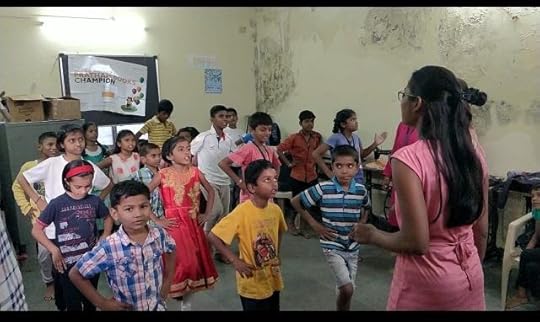
We all know that the strongest factor for any successful campaign is very strong foundations at the grass root level.
For any NGO that is on a mission to make the world a better place there needs to be a strong base of volunteers who are passionate, relentless and are empathetic too…
Here is an Interview with one of such volunteers at Mitti Ke Rang, an NGO that is working for widow empowerment and skill development.
This interview is a mirror to the pulse of young India.
What is your name and what do you do?My name is Diksha Singh and I am working with Mitti ke Rang, an organization working towards Widow’s Empowerment & leading The Project Women.
2.What are your interests?
Making things through waste or styling a particular thing into different ways. I like finding routes to different places and exploring new places. Love being around kids.
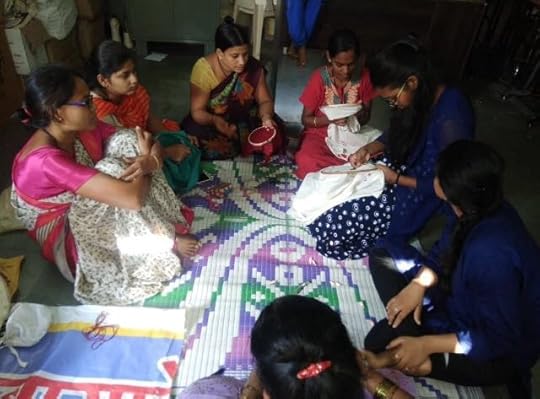
3.Why did you take up volunteering?
I took up volunteering because there is so much around we are not even aware of, and what’s the use of gaining so much from the society and not giving it back. I feel that through volunteering we get an exposure and see things on a larger scale than being in our comfort zones and do nothing. The main motive of me volunteering is spreading happiness and I strongly believe that we all crave for it and everyone deserves it.
4.How does it feel?
I feel privileged enough that I got an opportunity to teach the women’s out there who are so enthusiastic which gives me a motivation to do more. It’s an amazing experience because there is no expectation involved, it is like a give and take of knowledge and experience.
5.If you were to encourage others to follow your lead how would you do it?
If I was to encourage others I would say 3 things:
1.Do not keep any expectation when dealing with a group of women because you never know what is going to come.
2.Acceptance for whatever you do. Always try to get something new and different for yourself and for others which should keep one engaged.
3.Keep a positive attitude because only this can lead you ahead and always go for new opportunity.
6.Do you have ideas that will change the way we do things at grass root levels?
The way we are doing ground level work is what I think is going great and everyone know their job and they are doing their best in that.
7.How was your experience with MKR?
It’s been 2 months that I’m working with MKR and through MKR I got to know that how we look at widows and women in the society and feel that things are changing and getting modern, here I actually got to know that till today nothing has change the perception still remains. The time I joined I was a bit nervous that how am I going to interact with the women’s and handle things but I got an amazing team to support and a mentor Mr.Amit Jain who always stood at my back which gave to the confidence and motivation and now they have become my family and working with them fills me with great pleasure.
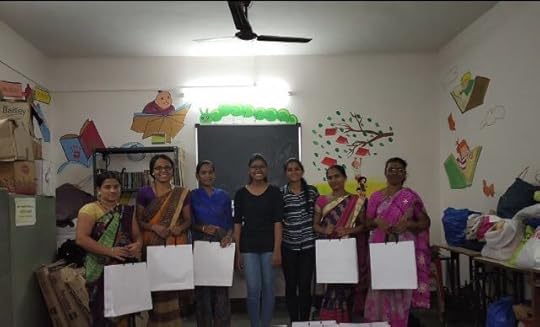
8.Anything else that you want to share with other readers/volunteers ?
I just want to share one thing that never limit yourself to a particular thing, keep exploring and expanding which will enhance you and the people around. Do things for others happiness you will automatically get happiness.
This is a glimpse at what young volunteers in India are looking upto. Share with us your volunteering story as to why you do what you do and how your little effort is bringing about gradual change.
Be the change you want to see. Indian youth seem to be responding to this call, giving us hope for a better Enabled India.

November 14, 2018
Share a book India Association — Bringing India together to the Reading Revolution
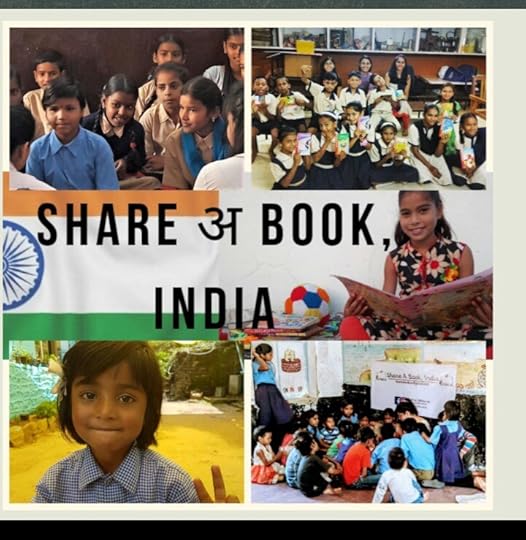
Do you think that complete strangers across a country as large and versatile as India come together over a period of 2 weeks to make a difference to the lives of many students.
Well that is exactly what happened with Share A Book India Association and their Diwali Book Donation drive. Driven across the country’s landscape, the drive struck at the heart of book lovers and people who are highly enthusiastic to be the change.
SABIA’s aim was to collect books towards setting up of libraries in underprivileged and low income schools across India.
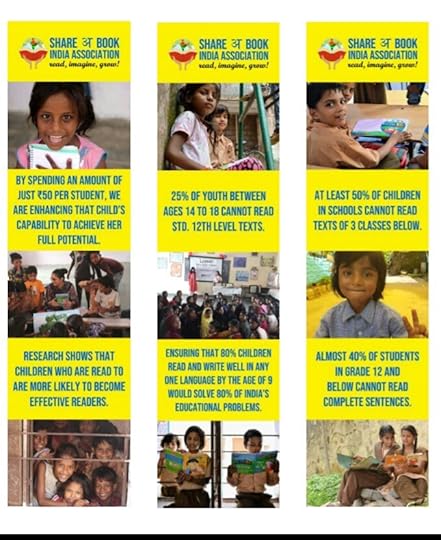
Over the course of their interactions at Kota, they found that most of the students in these low income schools had no access to library books and their reading and comprehension ability was alarming under question. So they came up with a solution of providing library facilities and additionally generating interest among the kids with fun reading and library development activities that will help the kids become more confident and improve their leadership skills and soft skills too…
Personally this struck as a wonderful idea, I started following them on Instagram and called them asking for them to start at Bengaluru, my home town and telling them that I shall lead the campaign here. Being involved in some small capacity towards making Rural schools enabled and empowered as much as their urban counterparts is a strong motivating factor for me and this came in as the perfect opportunity to lend my hand in this drive.
In one of the schools we have volunteered so far, I asked the kids in high school this simple question “ What is 2 * 22 ?” , I was given the answer “8. Very simple 2*2 is 4, 4*2 is 8”. This can change if we have a regular intervention at schools and also help generate interest among kids as to why they are reading and learning these in the first place. What better way to do that, than with stories.
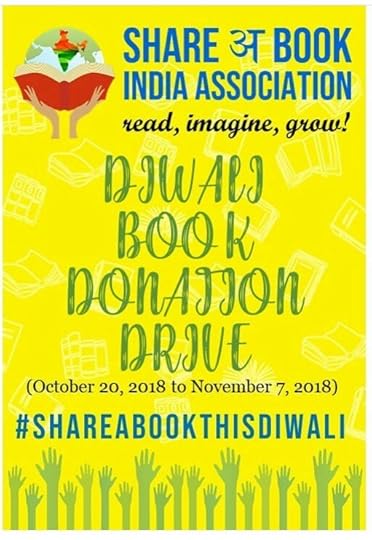
The donation drive was another feather in the cap of SABIA, as it involved a lot of work, coordination and planning in getting volunteers at various places. It gives me a great pleasure to know that people from various parts of the country came forward in great numbers; people who had never seen each other, never heard each other’s voice — came together for a cause that they believed in. It still gives me goosebumps that we were able to collect 17500 and more books in a period of two to three weeks.
I will let the sheer scale of these efforts sink in, as you make that mental calculations — I know you are smiling reading this. YES,YES,YES, more than 100 to 150 schools across India, more than 2000 kids on an easy average shall now have access to these books, reading sessions and storytelling sessions.
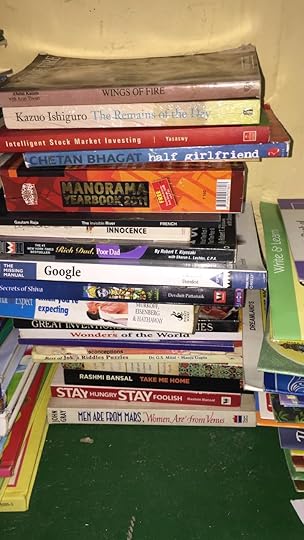
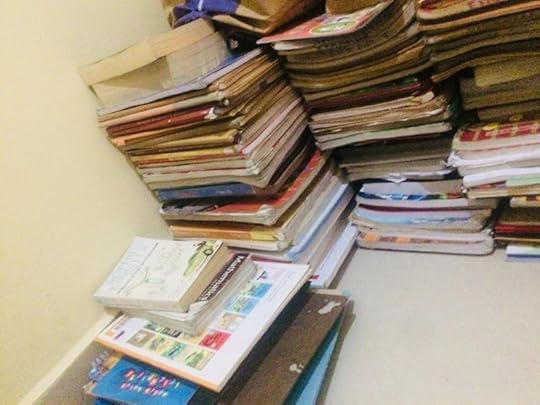
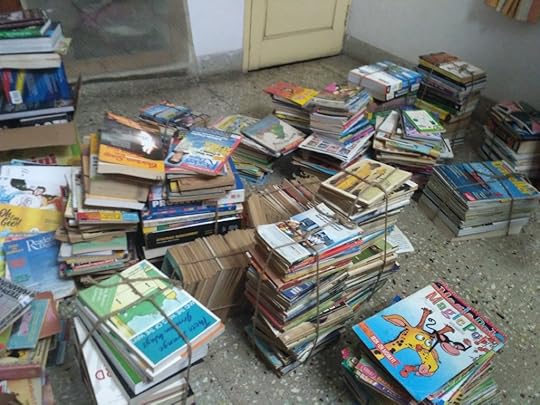
The books collected at my place have crossed an easy 1200 books. I have met people across my place, helped connect people across state lines and start the stint at Bengaluru. All because people from all over Bengaluru came forward to give their books, time and interest. Phew ! Some of the books have almost had 3 or 4 minimum pit stops in between my friends/cousins/colleagues houses and then reached me. It is a testament to the empathetic spirit that is still alive in people.
Such a heartwarming feeling is it not?
Well, if you think that I have had a field day, just imagine the guys who began this in Kota, Rajasthan — Priti Birgi and Shristi Parihar whose brain child has had us doing all this. SABIA and team have centres in Rajasthan, Delhi and Mumbai too. With volunteers running the library development classes in these states and a lot of states to be added in the interim next year; it is safe to say that India’s reading revolution has begun.
If you are reading this and want to join us in any capacity possible, contact us at www.instagram.com/shareabookindia and we shall aid you in your quest to help rural India become better in their overall development!!!

October 24, 2018
Bringing Change this Deepavali with Desi Lanterns or Akaash Buttis
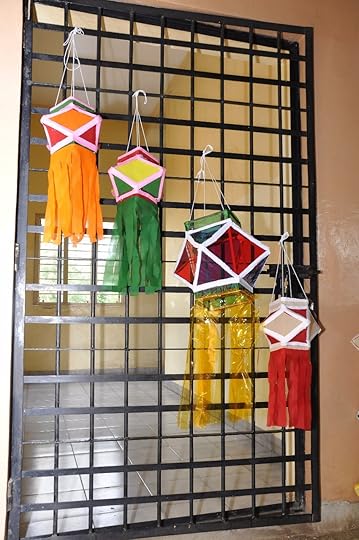 “This Akaash Butti is going to bring back the charm to your Deepavali festivities”
“This Akaash Butti is going to bring back the charm to your Deepavali festivities”When Deepavali is around, it is but common to find the sound of burning crackers and the smell of sulphur suffocating you around. We have seen that, over the years the crackers that are being burst in Bangalore have subsequently reduced and also there has been a general lack of interest and enthusiasm surrounding the joy of lights.
To make your Deepavali a much more safe and filled with energy, Samarpana a NGO based in Rajajinagar, Bengaluru has brought back the concept of the Swadeshi Akaash Butti or the Desi Lantern.
Samarpana, the NGO is run by Shivakumar Hosmani, an activist working with multi-dimensional causes. I had the pleasure of meeting him a few days and learning the reason behind launching this campaign of re-invigorating Deepavali with lights and with special effect to the Akaash Butti.
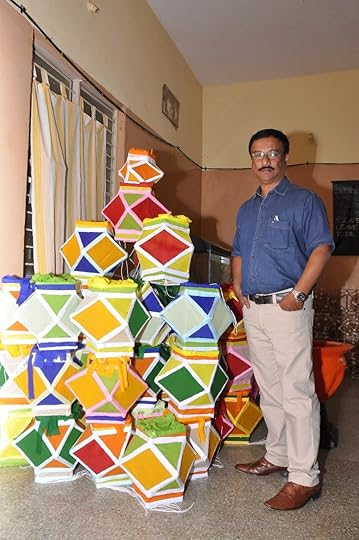
For those who dont know, the Akaash butti is made from locally available bamboo that is made in the form a lantern and coloured paper add to the vibrance and colour of the whole unit. It is strong, reliable and reusable making it a hugely environment friendly lantern that also brings back a Indian tradition of the festival of lights.
In his own words he explains that “ The campaign is run to promote the use of Indian products. Every year tons of plastic lanterns from China come to Indian shores. Every lantern sold is a bullet that is killing an Indian soldier. “
Additionally the lanterns that Samarpana is preparing is done through a juvenile convict rehabilitation programme where the young minds are completely turned towards to more productive minds rather than letting negative habits take root.
Listening to him recount the story of juvenile convicts turning their life around is rather inspiring and each time I think back it gives goosebumps that such a cause is being taken up. As an activist Shivakumar Hosmani is well known for his environmentally friendly efforts, his idea of the waste collection that he experimented in the late 90’s is now the basis of the collection methods followed by the BBMP; additionally the NGO helps kids in the rural schools across Karnataka by reusing notebooks that still have sheets left in them, reusing these unused papers to make new books.

Coming back to the lantern, it greatly reduces that plastic that is used. He also informs that these unused lanterns that come from China are dumped into the sea after Deepavali if they remain unused, wreaking havoc to the sea creatures and the marine ecosystem.
These plastic lanterns may end up like this !
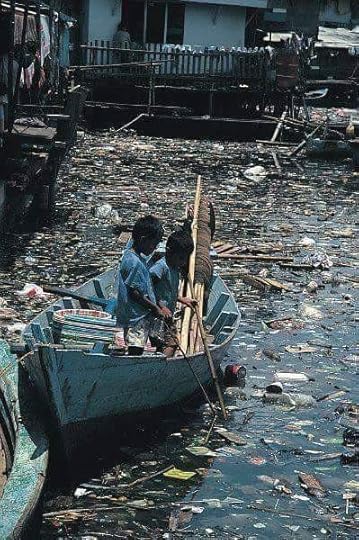
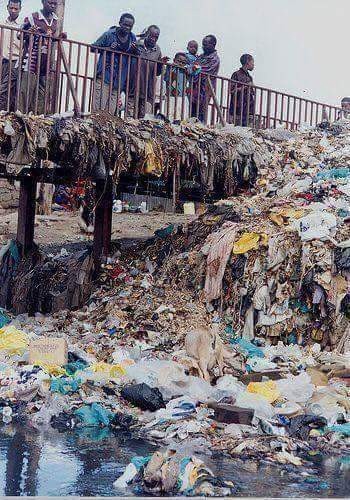 We urge you to join in the Swadeshi Lantern revolution by buying these authentic Indian lanterns that makes the environment safer, helps the rehab of juvenile convicts and most importantly hits the Chinese economy by the use of Swadeshi products. Contact Shivakumar Hosmani at 9980008074 and book your Akaash Butti now at just 250 INR per piece.
We urge you to join in the Swadeshi Lantern revolution by buying these authentic Indian lanterns that makes the environment safer, helps the rehab of juvenile convicts and most importantly hits the Chinese economy by the use of Swadeshi products. Contact Shivakumar Hosmani at 9980008074 and book your Akaash Butti now at just 250 INR per piece.The lanterns add value to your home by adding a tinge of tradition and a dash of vibrance to an otherwise dull Deepavali. Join hands with Samarpana in its quest to make your festival of lights more fulfilling…
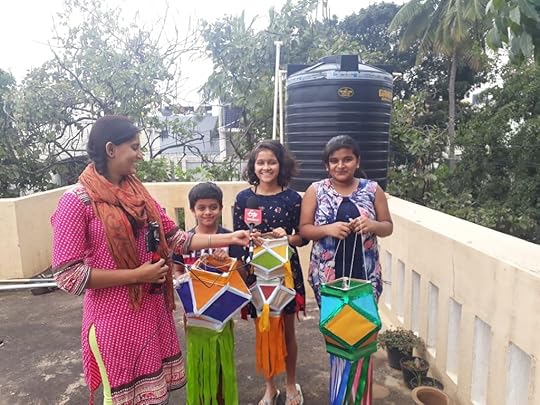
It was an absolute pleasure meeting and talking with Shivakumar Hosmani and his ideas and ideals definitely can infuse a deep sense of wanting to do more to the society around us. Additionally you could help Samarpana by joining in this drive of saving trees, water and unused sheets.


September 30, 2018
Mitti Ke Rang — Changing the lives of widows across the world with Widow empowerment
We see normal people with normal lives doing extra-ordinary things that inspire us completely. It is here that we realize that bringing change can happen with a thought turning into action.
I had the pleasure of having a chat with an inspirational young man, who is on a mission that is changing the lives of many women across India and other parts of the World.

Meet Amit Jain originally from Bhusawal Maharashtra working for gender equality and the empowerment of single women and widows across the country. His organisation Mitti Ke Rang has its branches across Pune, Maharashtra, India and also across 9 other countries.
Impressive, is it not? Well, the plot thickens as there is more…
In a candid conversation, he went on to say these golden words that can change the world for volunteers. “ A lot of people want to give back to the society and the only thing that stops them is that they do not know where to give” .
Amit comes from humble beginnings and tough childhood, losing his father when he was just three years old, his mother managed to make sure he studied in a convent school, his grandfather set up a small shop for his mother; his cousins, uncle and aunt helped them a great deal with a roof over their head and also with food and clothing and he landed in Pune looking for a job in 2012 with just 1000 rupees in hand. Over the years he has grown in stature in the corporate sector and has successfully managed to get a good income and get his mother to join him in Pune.
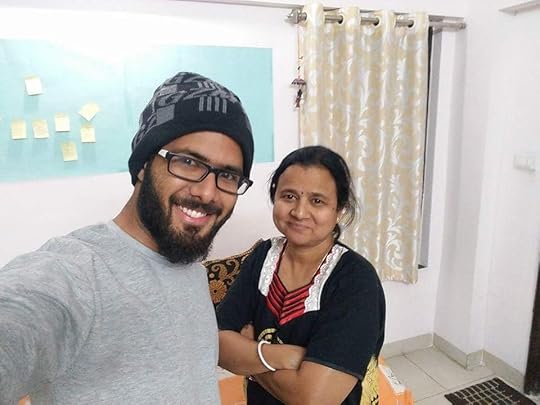
This is where Amit says, “ I wanted to give back to the society. We had struggled our way through life. My mother was not given the respect she deserved as a human being and as a woman because she was a widow. There was no one to guide her or give us employment opportunities. So I began Mitti Ke Rang to empower the widows and give them a chance at finding employment and acceptance”.
It is estimated that over 45 millions widows are there in India alone, and even after years of independence and development, widows still live under very tough conditions. Mitti Ke Rang now exists as an advocacy in 9 countries — Kenya, Zambia, Gambia, Pakistan, France, Fiji, Nepal, Spain.
Mitti Ke Rang began as a small venture with cloth donation drives, book donation drives done over the weekend and slowly they grew to include volunteers, Volunteers then began to become nodes of changes by becoming collection centres. From one small village to Pune, Pune to Maharashtra, Maharashtra to India and then to 8 other countries.
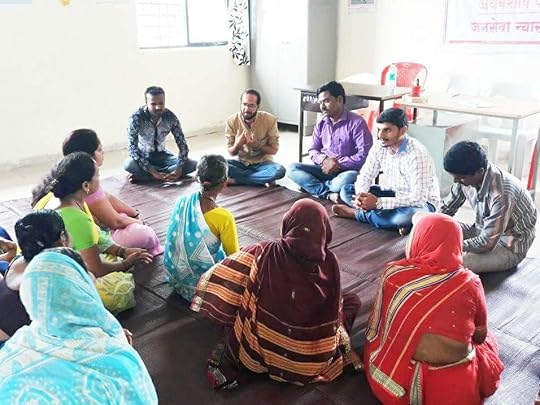
Mitti Ke Rang is completely self funded — with Amit investing half of this earnings each month to run the organisation.
Mitti Ke Rang operates in three programs -
Project Woman — To make sure that the standard of living of these single women and widows get a raise, through vocational trainings, tailoring and other classes conducted.
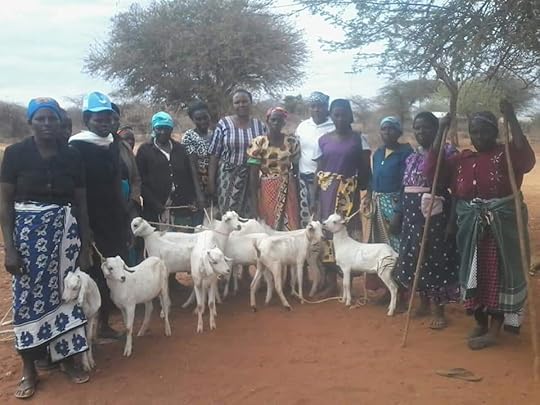
Project Reading — to help the kids of the widows to learn to read and write and speak confidently in their local language and also in English. Classes are conducted to help these kids fare better in life.
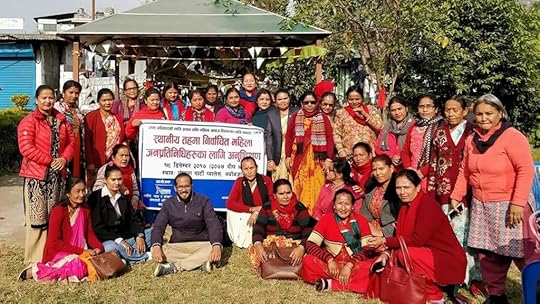
Community Centers in the slum area to help in the overall development of these souls that have been pushed away by society for no fault of theirs.
Lack of literacy and access to knowledge is stopping so many young women from doing extraordinary things. Like I have said before change comes in small steps — Mitti Ke Rang now has three people working for it full time, a batch of interns that keep the voices from the teaching rooms rings with laughter and excitement.
Amit was a part of the Commonwealth Youth Council held in 2017 and met youth leaders form over 52 countries and found synergy with many people out there and together they bring this mission of making widows empowered a reality across national boundaries.
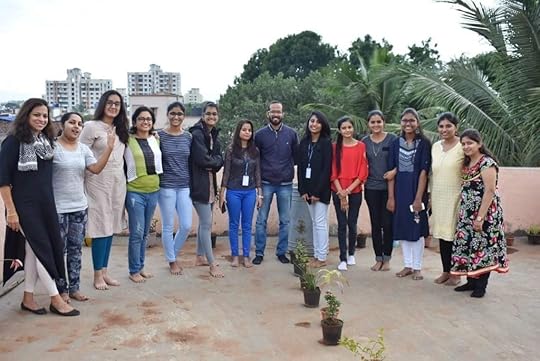
Amit’s story is a story of hope, grit and survival and his story drives him to make sure that no one suffers the fate his mother had to endure. His passion for taking this forward is unparalleled. Amit’s story is an inspiration for many.
I hope this story has kindled in you a fire to be the change, however small it is. Remember change comes is small packages and spreading happiness is a simple choice. If you are in Pune and want to contribute to this cause by teaching or conducting sessions for Mitti Ke Rang then get in touch with them via https://www.facebook.com/mittikerangofficial
India needs change makers like this, who are out to make the world a better place…
If you do know of similar change makers please do get in touch with me at pungidasa@gmail.com

September 4, 2018
Women Entrepreneurs making waves — Social Impact with Organiko
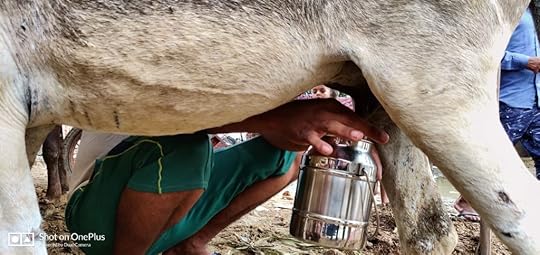
Women Entrepreneurs making waves — Social Impact with Organiko
There are about 3.4 billion of donkeys in India, and one litre of donkey milk can cost more than 2000 to 3000 INR.
Now that I have your undivided attention, I had the pleasure of talking to the founder of Organiko; Pooja Kaul.
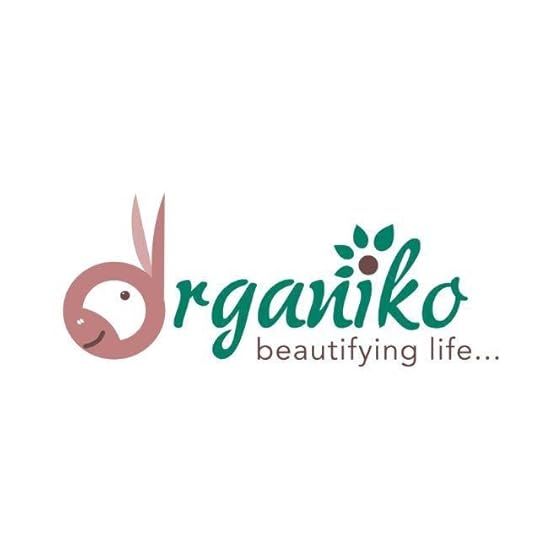
Organiko; a company, that works to create beauty products from “Donkey milk”.
Over the course of the interview she shed light on why they began this venture of theirs into a sector that is not mainstream. Currently Organiko is a 5 member team that works 24 donkey owners in Solahpur and Delhi NCR region and are the proud recipients of over nine awards for this venture.
Pooja informed me over the course of the discussion that they are a "for profit" venture that began last year. She geos on to tell me that this idea of starting a company was triggered by one of her mandatory projects that she had to complete as a part of her PG course in Social Innovations and Entrepreneurship at Tata Institute of social Sciences.
In her own words "I was always interested in doing something in the dairy sector, I was inspired by one of the Switzerland companies in the dairy sector and thought why can’t I do something here". Thus this idea was born. Over the course of her research she found that India has a huge resource of donkeys that is going underutilized and decided to do something about it.
The donkey is still considered a beast of burden and a butt of many jokes. Having begun with 14 donkey owners, she soon understood that the market for selling donkey milk is still rather taboo and found a better scenario for the beauty products.
Currently they have launched the Donkey Milk soap and have plans of launching Anti-aging cream and face wash also made from the donkey’s milk in the next year.

Their initial product as natural soaps made from donkey milk was a roaring success with over 300 units sold in quick time. Their project incubation is being done via the Atal Incubation Centre and has bagged many awards and recognition across the country.
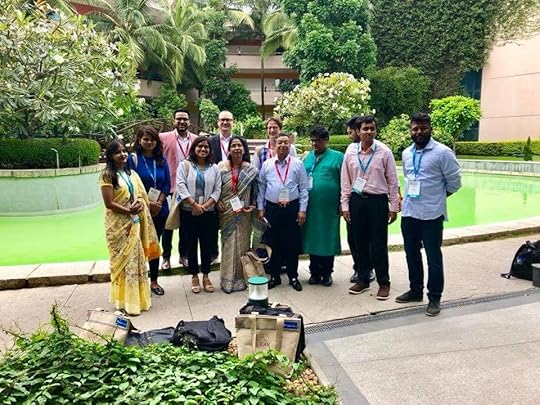
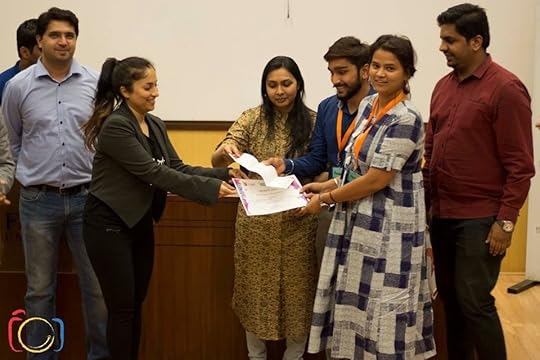
Pooja , Rishabh and Isha along with others have joined hands in making Organiko go place by amplifying it’s reach, here is profile of the entire team of Organiko.
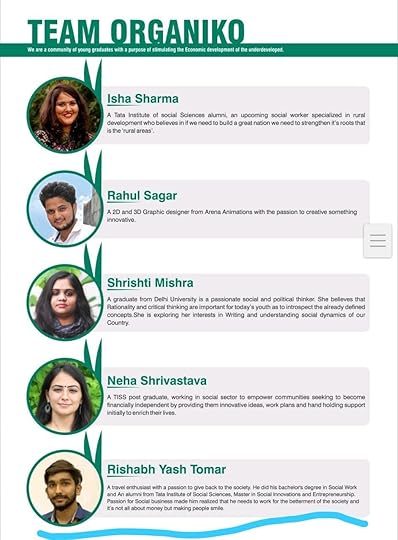
This initiative aims to be of benefit to the donkey rearers community who suffered from seasonal employment issues. Being nomadic tribes they are often found wandering looking for pastures, their kids suffer without a stable education, unemployment is rampant during monsoon, as they donkeys are left to roam around freely and the men find meagre paying odd jobs like painting and other physical labour.
Organiko swoops in to the rescue by giving them 2000 INR per litre of donkey milk, which eliminates the problem of seasonal employment; the donkeys get better conditions when compared to being a beast of burden most other times. The donkey is the new cash cow for these families.
Donkey milk with is natural medicinal properties is then used to make beauty products such as soap. At Organiko, their next idea is to provide employment to women of these communities in the production and marketing of these soaps making it a strong community led movement and also providing a chance at empowering women of the household.
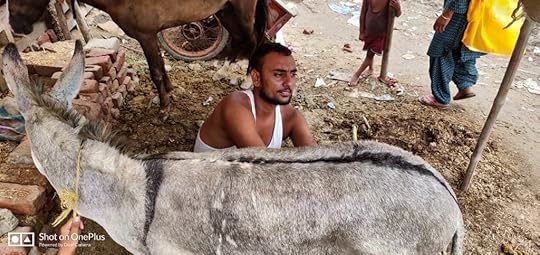
Directly consumed in some parts of India, donkey milk is rather not popular elsewhere, Organiko also conducts awareness drives that highlight its natural uses and this October they plan to launch a few new products in Delhi and Pan India and are on a mission to reach at least hundred such families that depend on donkeys for livelihood.
Pooja is full of passion, enthusiasm and beams with pride that by next year they shall be in Rajasthan and Himachal as well, scaling up and expanding their work across India.
Organiko presents a bold step in the direction of breaking taboos, exploring opportunities and being a ray of hope for many families of people and also the donkeys themselves benefit greatly from this initiative. It also adds an additional merit that this is run by a lady entrepreneur and her team, with a sense of pride in what they do what they do.
The “donkey is no laughing matter” is the motto of these young entrepreneurs. I wish that they grow to be a change in the social sector and provide more such innovative ideas to us all.
You can visit them and know more at their website
and support them by sharing about this project with your friends and family.
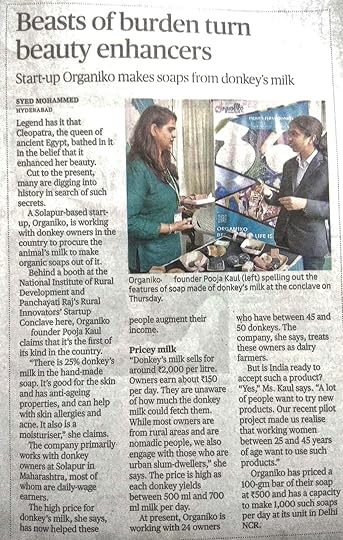

August 1, 2018
The Dying arts and the last gasps — Real life stories from everyday life
The Dying arts and the last gasps — Real life stories from everyday life
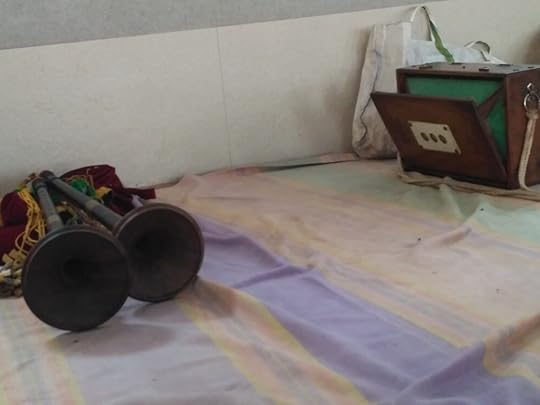
Sometimes you never know, it seems like that you can talk to a person, a random stranger of all the things that you want to say and be understood.
I have been that stranger who always gets to listen to stories from various people, there seems to be a magnet that attracts people and their stories.
Here I shall tell you of two people who I had the pleasure of talking to.
I had been to Mysore for my cousin’s marriage. After the dinner the night before the marriage festivities, I happened to have completed my dinner peacefully. I was waiting to head to another cousins’ place and hit the bed, to wake up early next day. I sat upon the table, that normally the musical instruments uncle who sit and play the instruments that are needed for the proverbial Gatti mela.
He came, this protagonist uncle, sat next to me for a few seconds, I knew this man is going to tell me his life story the moment I saw him.
He smiled, I smiled back.
He asked once, if I had dinner. I replied Yes.
Five minutes down the lane, he turned and asked the same question and I gave the same answer.
He went out, came back with a cement brick, rolled his towel over and kept it under it like a makeshift pillow. He then tried to sleep, he got back up. I asked him, “ Should I Move”, he said, “ Its okay, I am not yet sleepy”
He introduced himself, gave me a handshake. He did not seem drunk but his question seemed to come with one single thought in mind. He asked again “ did you have dinner? “ I smiled awkwardly and said yes. I enquired if he had his.
That was when he began. He told me of his life style.
His wife has a certain illness that prompts him to make frequents visits to the city of bangalore, where there is treatment. He comes over to a certain Nimhans hospital since the fees there is the least. Every wedding he plays the Harmonium for earns him money, which he uses for her treatment. He also went on to tell me that his grandfather and father used to play harmonium in the royal courts of the Mysore Maharajas. In native Kannada he went on to say, that currently he plays the harmonium for weddings, playing this instrument has been the only thing that has run in the family for generations. He stops there is a sadness in his eyes,” my son stopped that legacy, he wants nothing to do with music or this harmonium”, he runs a barber shop. Of all the things that he can do he runs a barber shop. The son of a harmonium player, runs a barber shop. It is my biggest regret in life though.
I go to places, weddings of people, I don’t even know, eat here and there, earn something and most of it goes in just travelling. If I go to the city once, the amount of rice I get for 100 Rs is too small compared to the 100 I can spend in a rural place. In my village I can be there like a king. Over the last twenty-eight years, I have helped my daughter by constructing a house that is worth around 40 lakhs. I get 3000 per wedding, 500 rupees gets done in travel, 500 in food that still keeps me hungry, then the trips to the doctor takes away most of it. I eat something that is available on the road side shops, they do not taste great, they suffice my immediate hunger, at times it makes me fall ill too.
In between all this serious conversation he has asked me if I have had dinner 6 more times, each time I have given him the same reply. But then he can say something more, my cousin arrives pulls me along to her house.
I bid him goodbye, he asks me to call him to my wedding. I smile at his genuineness and wave goodnight. He beams a smile and replies “Good night” in broken English. The pride on his face is so enriching and alive that it hits me just after I have turned, there is a sadness and there is also joy.
We don’t even acknowledge these artists, they come, they go. In a family that sang and played for kings, this frail old gentleman comes as the last of his kind. This art dies with him. No one to take the baton forward. There was something about him that I still cannot forget.
Switch back to Bengaluru, the bustling streets and the constant horns blaring, amidst all the chaos of the city there is a certain charm that exists to Gandhi- Bazaar, Basavangudi and Jayanagar, there still seems to be a touch of royal heritage in the way these hotspots function. There is an old school charm that exists to these places, green tree cover, parks and the hub of old gentlemen walking on the lanes just like old times. In all this beautiful existence, there exists a calm and serene place by the name “Indian Institute of World Culture” in BP Wadia road, named after the founder of this institute.
This place reeks of history and culture and an amazing library. I had heard of this library but even after over last four plus years of travelling in the vicinity of that place not been inside it. Today I went there, made a bee line for it and walked into a library.
It reminded me at once of the classic R K Narayan type stories, I half expected Swami to run into me and talk to me about his life but no this rather large hall of books was maintained by a librarian. It is been ages since I had seen an old school librarian, she carried a stack of books to her table and was entering the data on the computer. Chairs and tables arranged neatly for people to read, small chairs that looked adorable, tables that gave it a vintage feel, the smell of old books and the nostalgia of seeing so many books at once; books that defined my childhood.
Over the course of her conversation she told me that books nowadays are available on phone, kids no longer read, they can see the whole thing on youtube. She has been there for more than twenty years in that place, seen the changes happen, from the older generation of book lovers who spent afternoons reading in the library, sifting through books and smiling at them; her generation of readers who drastically cut down on reading when compared to the previous generation and the present generation that prefer to read them on phone, kindle and what not.
She laments that book reading in India is slowly dying, this place sees kids come in on Sundays, that too for a short duration of time. I proceeded to donate two of my books to the place. She also went to say that Kannada book readership has plummeted rather alarmingly over the years. The kids that read here on weekends normally stick to English rarely ever venturing towards the Kannada section.
No one writes letters anymore, like her I too think that letter writing as an art is almost dead in an era of whatsapp and social media. There was a charm to read letters, write them in neat pristine handwriting, preserve them and keep them safe. She tells that “I have seen telegrams too and the big phones that was used for trunk calls, the dialing machines with rotating disks. I used to be scared to pick the phone, not knowing what to talk. Incidentally I used to collect stamps from all the letters and I even had a book for it” . Today it seems as if she is talking of an era that never existed or is forgotten in ancient history.
I bid her goodbye and make my way home. As I take a step away from the library, the spacious and serene space of the IIWC, I head home to a world of chaos and traffic, horns and speed.
Something about the library, the look it gave as soon as I entered it, like an old grandmother waiting for grandkids to return and talk to her in the old age home.
There are some people who you meet and connect to, draw their life story by making them comfortable sharing it, some want to tell you outright, dying to get rid of the story before they know it has met its end. If you too have stories to tell and conversations to make, please feel free to hit me up. Until then keep reading and keep talking.

July 19, 2018
I have been wanting to find something like this since ages.
I have been wanting to find something like this since ages. I hope I can reach more readers with your app now.
The way we consume/read stories may change, but storytelling and the thrill of reading may never die.

July 12, 2018
Inspiring stories of people who are changing the world — One smile at a time
There is so much power in our thought, one thought can change the world. If you can make that thought into a dream, a dream into reality — who knows how many lives you can affect with this thought.
It all began with one thought, this young woman had –“even after such a long time, if menstruation for a young woman like myself can still be a little uncomfortable, how could the mentally challenged women deal with it?”. Deepthi Seshadri found this thought to consume most of her time, during her visits to various NGOs that cater to the needs of these beautiful souls.
In her own words, “I checked if someone was working on this, I could not find anyone who was helping them with regards to this. So, we decided to something about it.
Menstruation is a ritual that happens every month for young women after they hit puberty, most of the young women find it difficult to discuss their tryst with it openly, the ones who are mentally challenged severely may not express it at all. Every mentally challenged woman is normally looked after by another woman who looks after everything about them, it falls upon them to know and help these women stay hygienic and safe from infections after or during their periods. It can get messy and rather uncomfortable for the women and their care takers too; applying the sanitary pads, removing them and safely disposing them.
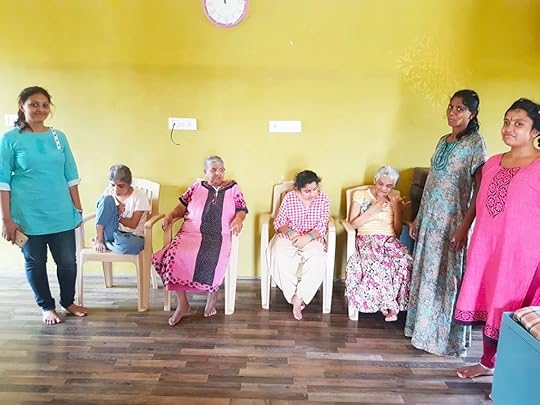
Nagu Foundation was founded by Deepthi Seshadri, and two more friends of hers, who share the dream of making things menstruation comfortable and hygienic for the women who are mentally challenged and their care takers. Founded in 2016, November they have made an impact on the lives of 50 women in NGOs in various parts of Karnataka and slums of Bangalore.
In a candid talk with her, we found that she has plans of making the present solution of a one-time use integrated product of a sanitary pad and innerwear in one piece; an eco-friendly product. In the next two years they plan to reach out to more than 300 women.
For a lot of women, menstruation is a personal ritual that they do not want to openly talk about, she recounts that in one of her visits to a slum, in one of the houses, she went along with a male friend to distribute the pads. “He had come along with me, all the women caretakers and their wards were there, no one spoke about anything for more than ten minutes, it is then that I realized that my friend was still within hearing distance. I told him to wait for me outside and only then did one or two speak up. “ If this is the scene in Bengaluru, then imagine how much of a difficulty it is for us to ask them to talk about this topic and help them embrace our solution.
There is a spark in her eyes, a gentleness in her voice, a conviction in her heart that all began as one thought and today thanks to a lot of people who believe in the cause that sanitary health must also reach women who are mentally challenged, Nagu Foundation is growing and helping a lot of women in a very personal and sensitive matter.
Nagu foundation began as a thought and as the thought goes, one thought can change the world. Do you want to join hands with her and do your bit towards this cause, then visit Nagu Foundation and bring smiles on the faces of many women.
you can follow the updates here : https://www.facebook.com/nagufoundation/
If you know of such stories of people who inspire you, please do let the author know, so that their story could be shared with the world.

July 4, 2018
Stefani Vader — Thank you so much for the feedback.
Stefani Vader — Thank you so much for the feedback. This story came to my head ages ago but it finally did come through finally. It feels great to recieve such a positive feedback ! thank you :-)




